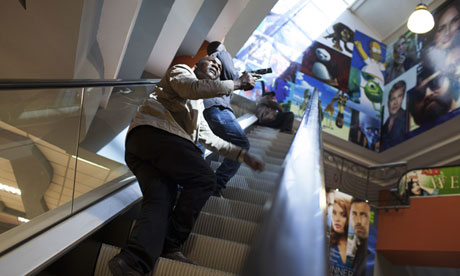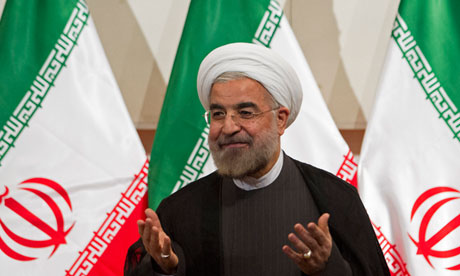PRESS RELEASE: ICTJ Concerned by Retroactive Sentencing in Bangladesh Genocide Trial
Dozens Killed in Nairobi Mall Attack
By Erica Smith
Impunity Watch Reporter, Africa
NAIROBI, Kenya — At least 68 people were killed and 200 wounded in a terror attack on the Westgate Mall in Nairobi this Saturday and Sunday.

The attack started around lunch time yesterday when grenades were thrown into the crowd. Lunch time is peak foot time traffic at the mall. After the grenades were thrown gunman started firing indiscriminately into the panicked crowd. Shoppers took cover and hid in shops and under tables, the grocery store that spans most of the mall was a main hiding place for many people, and the main scene of a fire fight between security forces and attackers.
Reports indicate that different groups of armed men attacked the mall in coordinated groups. Kenyan officials say that about 10,000 people shop at the mall on the weekend and that it is a popular destination for the wealthy and foreigners.
Al-Shabab, an Islamist group from Somalia, has claimed responsibility for the attacks. The attackers also took hostages and a standoff has ensued.
“Waiting ambulances are parked outside while sporadic gunfire can be heard coming from inside Westgate Mall,” NPR’s Gregory Warner reported from Nairobi early Sunday. “Kenyan police said that the gunmen have been ‘contained’ but there are still hostages in unsecured locations. Special police forces are securing the building.”
As of the writing of this article, there are still hostages in the mall and the standoff between the attackers and security forces is still ongoing. Kenyan security forces are reporting that the mall is mostly under their control and that most of the hostages have been rescued.”Our concern is to rescue all hostages ALIVE and that is why the operation is delicate,” the Kenya Defense Forces said on Twitter.
For further information, please see:
Guardian — Nairobi siege: some hid, others played dead as gunmen stalked the mall — 22 September 2012
NPR — Nairobi Mall Attack: Civilians Remain Hostages; Dozens Dead — 22 September 2013
Yahoo News — Most hostages rescued, shopping mall mostly secure: Kenyan army — 22 September 2013
BBC News — Nairobi Westgate shoot-out kills 11 in Kenya — 21 September 2013
Guardian — Nairobi mall attackers could not have picked a better target — 21 September 2013
Presidents Obama and Rouhani Open to a Face to Face Meeting
by Michael Yoakum
Impunity Watch Reporter, North America
WASHINGTON, D.C., United States – President Obama faces potential diplomatic inroads with Iran, Syria, and Palestine as he prepares to head to the UN General Assembly Monday. With a new President of Iran, progress towards a peaceful disarming of Syria, and restarted talks in Palestine, things are looking much different than last year.

The biggest change is the newly elected President of Iran, Hassan Rouhani, who has reopened communication with the United States through his Foreign Minister, Javad Zarif. While President Obama is not scheduled to meet directly with Rouhani, the two have left open the possibility of talking during the gathering. Rouhani recently expressed his willingness to meet with the US in an interview.
“The problem won’t be from our side,” Rouhani stated, adding “We have sufficient political latitude to solve this problem.”
Some western diplomats believe Rouhani is taking a big risk by favor diplomatic talks with the US over anti-American rhetoric. There are concerns that Rouhani could face resistance from hard-liners in Tehran if his approach does not yield an easing of sanctions on Iran.
Ben Rhodes, a deputy White House national security adviser, told reporters that he still believes there is time for a diplomatic solution to prevent Iran from developing nuclear weapons.
In line with Rhodes’ view, Rouhani said in an interview with NBC that Iran would never seek to acquire nuclear weapons and he had “sufficient political latitude” to discuss Iran’s nuclear program. Rouhani derives his new political latitude from statements by Iran’s supreme leader, Ayatollah Ali- Khamenei, who said that diplomacy sometimes calls for “heroic flexibility.”
If Presidents Obama and Rouhani were to meet at the General Assembly, this would be the first time for the US and Iranian heads of state to meet face to face since the 1979 Iranian Revolution.
For more information, please see:
The Washington Post – On eve of UN session, Obama finds unexpected diplomatic openings on Iran, Syria, Mideast peace – 22 September 2013
ABC News – 4 Things to Watch for at the UN General Assembly Next Week – 21 September 2013
The Guardian – White House indicates Obama could meet Iran president Rouhani at UN – 20 September 2013
Fox News – Iran’s Rowhani makes new overtures towards the West – 19 September 2013
Reuters – Analysis: Obama may extend his hand to Iran’s Rouhani at U.N. – 19 September 2013
Terror Suspect Escapes Indian Court
By Kevin M. Mathewson
Impunity Watch Reporter, Asia
MUMBAI, India — A manhunt has been launched in Mumbai, India after a suspected member of the militant group Indian Mujahideen (IM) escaped from court on Friday.

Afzal Usmani, a Mujahideen operative accused in the 2008 Ahmedabad bombings, escaped from a special Maharashtra Control of Organized Crime Act (MCOCA) court after a major security lapse.
Usmani had erlier tried to escape from a crime branch headquarters after his initial arrest in 2008.
Sometime after lunch on Friday, drama unfolded in the courtroom. As a lawyer began his argument, a police escort rushed in and informed the special judge that Usmani was missing. The court then decided to defer the framing of charges till September 25. Arrest warrants have been issued for Usmani’s arrest.
Along with Usmani, four other suspects accused in the Ahmedabad bombings, who are currently out on bail, also appeared before the court.
Special Judge AL Pansare termed the escape a “serious offense”. “It is negligence on the part of the escort team which brought the accused to court,” the judge said.
Usmani was one of 21 IM members arrested on charges of criminal conspiracy after the 2008 bombings in Ahmedabad and Surat. It’s alleged that Usmani was involved in stealing four cars that were used to transport the explosives to Ahmedabad and Surat. Nearly 50 people died in 17 blasts in Ahmedabad.
Faiz Usmani, Afzal’s brother, died after questioning by police in connection with the Mumbai blasts of 2011. The Usmani family alleges that he had been tortured, but an autopsy determined that he died of a heart attack.
The escape of Afzal Usmani raises serious question about police negligence and the security system in place for transporting inmates to and from jail.
For further information, please see:
BBC News – India hunt as terror suspect Afzal Usmani flees Mumbai court – 20 September 2013
The Indian Express – Indian Mujahideen operative, arrested in Guj blasts case, escapes from Mumbai court – 20 September 2013
The Times of India – Usmani, who fled from court, helped crack IM module in Mahrashtra – 20 September 2013
The Economic Times – Indian Mujahideen operative Afzal Usmani escapes from Mumbai court – 20 September 2013
Hindustan Times – Terror suspect Afzal Usmani escapes from court in Mumbai – 20 September 2013